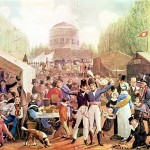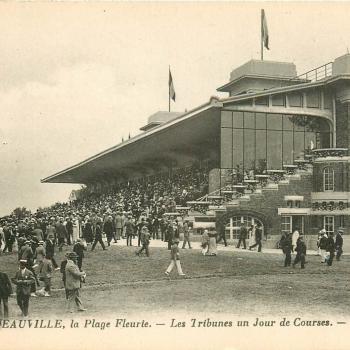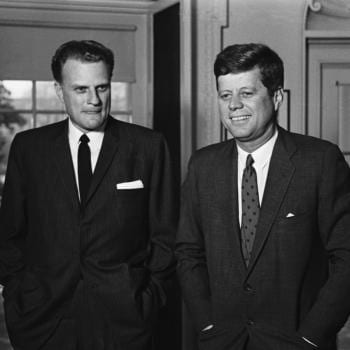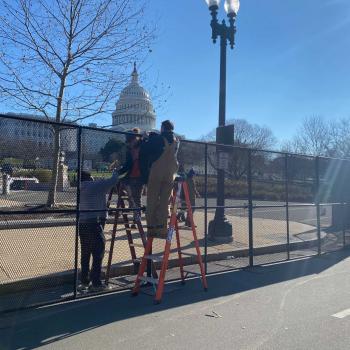Staying on the right side of history is tricky in these fast changing times. Back in 2015 Christians in the U.S. needed to figure out what to do about gay marriage after Obergefell v. Hodges. My own communion, the Orthodox Presbyterian Church last summer held a conference on what churches might think about doing in the light of the new interpretation of the Constitution. But by then gay marriage had moved to the back pages, Cailtyn Jenner had moved transgenderism above the fold, and churches needed to think about plumbing — not genitalia but bathrooms.
This comes to mind with the Southern Baptist Convention’s recent declaration against the Alt-Right at its 2017 convention. Baptists may have thought they were on the right side of the cultural divide but then President Trump praised the West in Warsaw and the Alt-Right took on a new meaning. At Vox Sarah Wildman wrote about ideals that many Southern Baptists might regard as wholesome and even Christian:
This morning in Warsaw, Poland, President Donald Trump issued a battle cry — for “family, for freedom, for country, and for God” — in a speech that often resorted to rhetorical conceits typically used by the European and American alt-right. It sounded, at times, not just like the populists of the present but the populists of the past.
From white supremacy to family and freedom, the Alt-Right had shifted its meaning in less than a fortnight.
Peter Beinhart piled on at the Atlantic:
The West is a racial and religious term. To be considered Western, a country must be largely Christian (preferably Protestant or Catholic) and largely white. Where there is ambiguity about a country’s “Westernness,” it’s because there is ambiguity about, or tension between, these two characteristics. Is Latin America Western? Maybe. Most of its people are Christian, but by U.S. standards, they’re not clearly white. Are Albania and Bosnia Western? Maybe. By American standards, their people are white. But they are also mostly Muslim.
Again, in the eyes of Trump’s critics “the West” is code for white Christian men. Good thing the SBC does not have “West” in its name. But if they stand for freedom and families, their condemnation of the Alt-Right may be a form of self-hatred.
Lots of people have weighed in on the over reaction to Trump’s speech. (Ron Granieri is especially astute on the Polish political context for President Trump’s remarks.) The little bit that this intervention might add is a reminder that “the West” and Western Civilization did not used to be such fighting words. In fact, throughout most of the twentieth century, the study of the West was standard fare at the United States’ elite universities. To be sure, the reasons for studying the West often had political motives at play. The first course in Western Civ started at Columbia University in 1919 just after World War I as an effort to recover a shared sense of culture and civilization and avoid another war. Then during the Cold War when the U.S. was the leader of the West against the Communist world, identifying and defending the West was an unquestioned good, at least until critics of the Vietnam War began to question the wholesomeness of America’s version of the West.
As someone born during the Nixon presidency, Beinhart should be old enough to remember the great books tradition that Western Civilization bequeathed to English and American universities (he studied at Oxford and Yale). Granted, he may have started university just when the academy was debating what to do about the so-called Western canon. He may have even been a freshman around the time that Jesse Jackson was leading the chant at Stanford University, “Hey, Hey, Ho, Ho, Western Civ Has Got To Go!”
But surely he knows better than to identify the West in racial and religious categories. Were Clement of Alexandria and Augustine white? They were Christian but did not come from Europe. What about Jesus and Paul? Again, these fall in the Christian tradition (though Jesus himself is not exactly the founder of a religion but very God of very God) but both men are of Jewish descent and not from Europe. And what to do with Thomas Hobbes or Montaigne or Descartes or Kant or Hegel? Again, they are white and men but not exactly exemplars of Christianity.
Lots of people who identify with the West don’t need very long to discover that authors in the Western canon hardly speak with one voice. Europeans inherited traditions from the Hebrews, Greeks, Romans, and Christians. That the West became a dominant force in world history is not a function of ideas as much as it is an accident of history, though Europeans have not gotten over the inspiration for global influence from the Roman Empire or the universality of the Roman Catholic Church. In other words, the West is so much larger than the Alt-Right.
Or was the Atlantic a forerunner of the Alt-Right when it published this piece by Bernard Lewis after 9-11:
To a Western observer, schooled in the theory and practice of Western freedom, it is precisely the lack of freedom—freedom of the mind from constraint and indoctrination, to question and inquire and speak; freedom of the economy from corrupt and pervasive mismanagement; freedom of women from male oppression; freedom of citizens from tyranny—that underlies so many of the troubles of the Muslim world. But the road to democracy, as the Western experience amply demonstrates, is long and hard, full of pitfalls and obstacles.
If the peoples of the Middle East continue on their present path, the suicide bomber may become a metaphor for the whole region, and there will be no escape from a downward spiral of hate and spite, rage and self-pity, poverty and oppression, culminating sooner or later in yet another alien domination—perhaps from a new Europe reverting to old ways, perhaps from a resurgent Russia, perhaps from some expanding superpower in the East. But if they can abandon grievance and victimhood, settle their differences, and join their talents, energies, and resources in a common creative endeavor, they can once again make the Middle East, in modern times as it was in antiquity and in the Middle Ages, a major center of civilization. For the time being, the choice is theirs.












